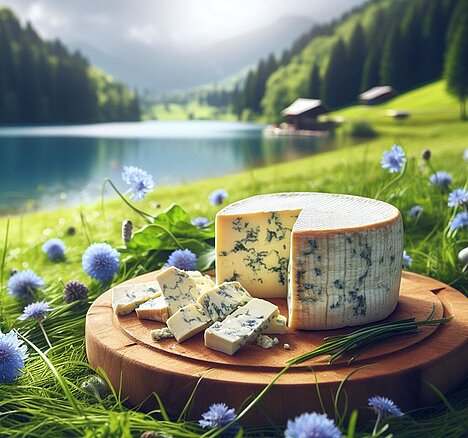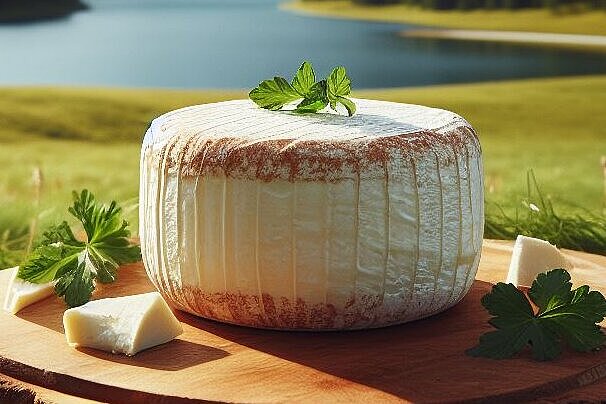Gorgonzola

Gorgonzola is a delicious Italian blue cheese made from cow's milk. It has a creamy consistency and a tangy taste that many people love. But what about dogs? Can your four-legged friend have a nibble of this cheese or is it harmful to them? In this article, you'll find out everything you need to know about Gorgonzola in relation to dogs.
What is Gorgonzola?
Gorgonzola is a soft cheese with at least 48% fat in dry matter that is produced in the Italian regions of Piedmont and Lombardy. It has a protected designation of origin and may only be produced in these regions. The cheese has a reddish rind covered with gray mould spots. The paste is yellowish-white and streaked with blue-green mold veins, which are created by a noble fungus culture that is added to the milk. The mould is edible and gives the cheese its characteristic aroma. Depending on the degree of ripeness, Gorgonzola is soft and creamy or rather firm and crumbly. It tastes spicy and intense, with a sweet or salty note.
What are the benefits of Gorgonzola for dogs?
Gorgonzola contains several nutrients that are important for dogs, such as
- Protein: cheese is a good source of protein for dogs, which is needed to build and maintain muscles, skin, hair and immune system.
- Calcium: Cheese is rich in calcium, a mineral that contributes to strong bones and teeth.
- Phosphorus: Cheese also contains phosphorus, which together with calcium is important for bone health.
- Vitamin A: Cheese provides vitamin A, a fat-soluble vitamin that is important for vision, skin and mucous membranes.
- Vitamin B12: Cheese is one of the few plant sources of vitamin B12, a water-soluble vitamin that is important for the formation of red blood cells and the functioning of the nervous system.
Gorgonzola can therefore serve as a treat or reward for your dog in small quantities and provide him with some health benefits.
What are the disadvantages of Gorgonzola for dogs?
However, Gorgonzola is not only good for dogs, but can also have some disadvantages, such as
- Lactose: Cheese contains lactose, a milk sugar that many dogs do not digest well. This can lead to diarrhea, flatulence or vomiting.
- Fat: Cheese is very high in fat and can lead to obesity or pancreatitis if eaten in excess.
- Salt: Cheese contains a lot of salt, which can increase blood pressure and lead to heart problems or kidney failure.
- Mold: The mold in Gorgonzola can trigger allergic reactions in some dogs or lead to gastrointestinal problems.
Gorgonzola is therefore not a suitable food for dogs and should only be given in very small quantities and rarely.
Gorgonzola is a delicious Italian blue cheese that contains some nutrients for dogs, but also carries many risks. It can lead to digestive problems, allergies or serious illnesses in some dogs. Therefore, you should only give your dog very little and very rarely Gorgonzola and always pay attention to his reaction.
If you notice any signs of hypersensitivity or poisoning in your dog, you should see your vet immediately. We are not a substitute for a vet, but we try to be as accurate as possible. Every dog reacts differently and we recommend you get a second opinion or consult your vet if in doubt.
Stay healthy and take good care of your four-legged friend!😊
Similar to Gorgonzola
Roquefort is a cheese named after the village of Roquefort-sur-Soulzon in the south of France. It has a protected designation of origin, which means that it can only be produced in this region under...
Stilton is a cheese that takes its name from the village of Stilton in Cambridgeshire, where it was first sold in the 18th century. However, it can only be produced in the counties of Derbyshire,...
Cambozola is a soft cheese with blue mold that has a creamy and rich consistency. It has a mild and slightly sweet taste, reminiscent of butter and cream. It has a white rind, which is edible, and a...
Bleu d'Auvergne is a cheese made from raw or pasteurized cow's milk, which is mixed with blue mould cultures (Penicillium roqueforti). It is produced in round wheels weighing 2 to 3 kg, which are...



